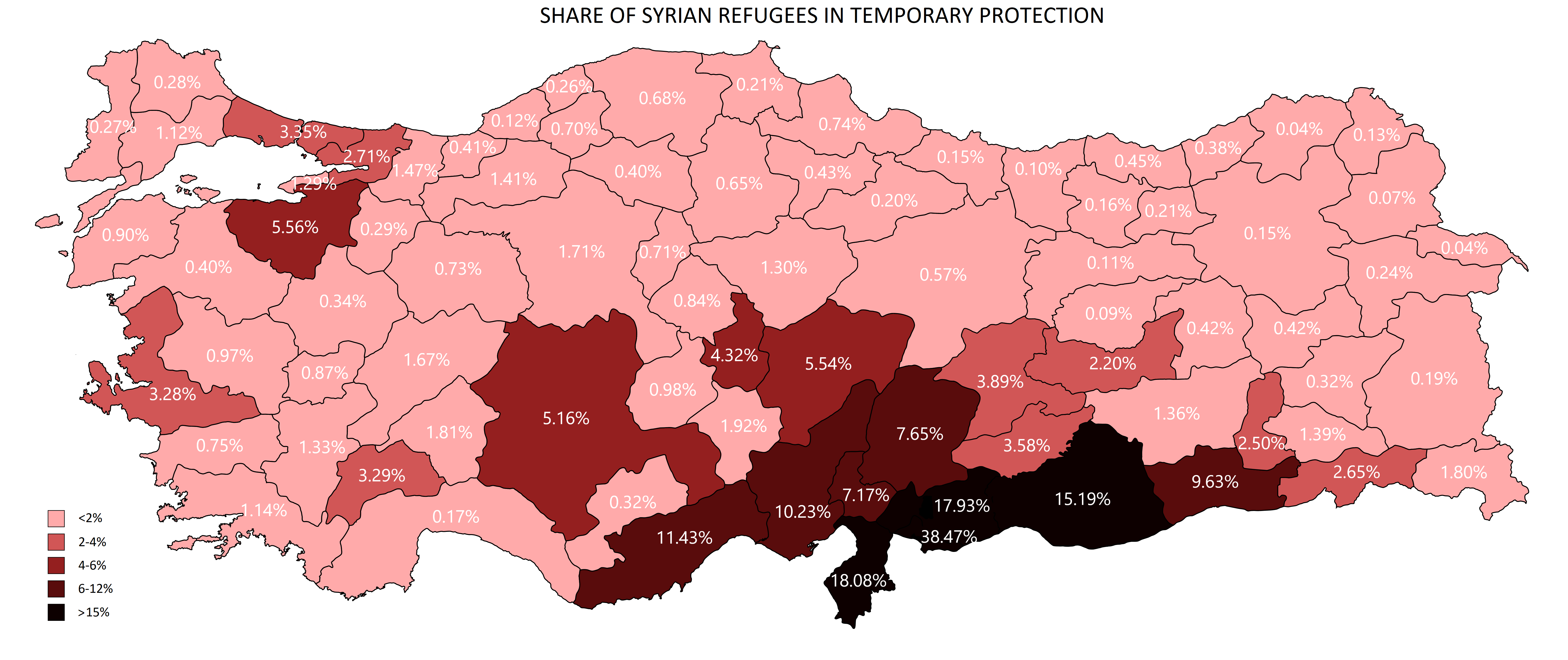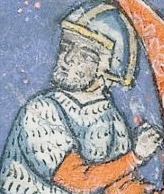|
Syrians In Turkey
Syrians in Turkey (, ), includes Turkish citizens of Syrian origin, Syrian refugees, and other Syrian citizens resident in Turkey. As of January 2023 there are more than 3,500,000 registered refugees of the Syrian Civil War in Turkey, which hosts the biggest refugee population in the whole world. In addition, about 100,000 Syrian nationals reside in Turkey with a residence permit. Apart from Syrian refugees under temporary protection and Syrian citizens with a residence permit; 230,998 Syrian nationals were given Turkish citizenship as of April 2023. Syrians are generally concentrated in the border provinces and major cities in Turkey, and only 1.3% of them live in refugee camps. Istanbul, the most populous city in Turkey, hosts the highest number of Syrian refugees, with approximately 550,000 registered people. History Syrians in Turkey include migrants from Syria to Turkey, as well as their descendants. The number of Syrians in Turkey is estimated at 4 million people ... [...More Info...] [...Related Items...] OR: [Wikipedia] [Google] [Baidu] |
Istanbul
Istanbul ( , ; tr, İstanbul ), formerly known as Constantinople ( grc-gre, Κωνσταντινούπολις; la, Constantinopolis), is the List of largest cities and towns in Turkey, largest city in Turkey, serving as the country's economic, cultural and historic hub. The city straddles the Bosporus strait, lying in both Europe and Asia, and has a population of over 15 million residents, comprising 19% of the population of Turkey. Istanbul is the list of European cities by population within city limits, most populous European city, and the world's List of largest cities, 15th-largest city. The city was founded as Byzantium ( grc-gre, Βυζάντιον, ) in the 7th century BCE by Ancient Greece, Greek settlers from Megara. In 330 CE, the Roman emperor Constantine the Great made it his imperial capital, renaming it first as New Rome ( grc-gre, Νέα Ῥώμη, ; la, Nova Roma) and then as Constantinople () after himself. The city grew in size and influence, eventually becom ... [...More Info...] [...Related Items...] OR: [Wikipedia] [Google] [Baidu] |
Sunni Islam
Sunni Islam () is the largest branch of Islam, followed by 85–90% of the world's Muslims. Its name comes from the word '' Sunnah'', referring to the tradition of Muhammad. The differences between Sunni and Shia Muslims arose from a disagreement over the succession to Muhammad and subsequently acquired broader political significance, as well as theological and juridical dimensions. According to Sunni traditions, Muhammad left no successor and the participants of the Saqifah event appointed Abu Bakr as the next-in-line (the first caliph). This contrasts with the Shia view, which holds that Muhammad appointed his son-in-law and cousin Ali ibn Abi Talib as his successor. The adherents of Sunni Islam are referred to in Arabic as ("the people of the Sunnah and the community") or for short. In English, its doctrines and practices are sometimes called ''Sunnism'', while adherents are known as Sunni Muslims, Sunnis, Sunnites and Ahlus Sunnah. Sunni Islam is sometimes referred ... [...More Info...] [...Related Items...] OR: [Wikipedia] [Google] [Baidu] |
Armenians
Armenians ( hy, հայեր, ''hayer'' ) are an ethnic group native to the Armenian highlands of Western Asia. Armenians constitute the main population of Armenia and the ''de facto'' independent Artsakh. There is a wide-ranging diaspora of around five million people of full or partial Armenian ancestry living outside modern Armenia. The largest Armenian populations today exist in Russia, the United States, France, Georgia, Iran, Germany, Ukraine, Lebanon, Brazil, and Syria. With the exceptions of Iran and the former Soviet states, the present-day Armenian diaspora was formed mainly as a result of the Armenian genocide. Richard G. Hovannisian, ''The Armenian people from ancient to modern times: the fifteenth century to the twentieth century'', Volume 2, p. 421, Palgrave Macmillan, 1997. Armenian is an Indo-European language. It has two mutually intelligible spoken and written forms: Eastern Armenian, today spoken mainly in Armenia, Artsakh, Iran, and the former Soviet ... [...More Info...] [...Related Items...] OR: [Wikipedia] [Google] [Baidu] |
Syrian Turkmen
Syrian Turkmen, also referred to as Syrian Turkomans, Turkish Syrians, or simply Syrian Turks or Turks of Syria, ( ar, تركمان سوريا; tr, Suriye Türkmenleri or ) are Syrian citizens of Turkish people, Turkish origin who mainly trace their roots to Anatolia (i.e. modern Turkey). Turkish language, Turkish-speaking Syrian Turkmen make up the third largest ethnic group in the country, after the Arabs and Kurds respectively. The majority of Syrian Turkmen are the descendants of migrants who arrived in Syria during Ottoman Empire, Ottoman rule (1516–1918);. however, there are also many Syrian Turkmen who are the descendants of earlier Turkish settlers that arrived during the Seljuk Empire, Seljuk (1037–1194) and Mamluk Sultanate (Cairo), Mamluk (1250–1517) periods. Some estimates indicate that if Arabization, Arabized Turkmen (i.e. those who no longer speak their main language) are taken into account, then they form the second largest group in the country.. The major ... [...More Info...] [...Related Items...] OR: [Wikipedia] [Google] [Baidu] |
Kurds
ug:كۇردلار Kurds ( ku, کورد ,Kurd, italic=yes, rtl=yes) or Kurdish people are an Iranian ethnic group native to the mountainous region of Kurdistan in Western Asia, which spans southeastern Turkey, northwestern Iran, northern Iraq, and northern Syria. There are exclaves of Kurds in Central Anatolia, Khorasan, and the Caucasus, as well as significant Kurdish diaspora communities in the cities of western Turkey (in particular Istanbul) and Western Europe (primarily in Germany). The Kurdish population is estimated to be between 30 and 45 million. Kurds speak the Kurdish languages and the Zaza–Gorani languages, which belong to the Western Iranian branch of the Iranian languages. After World War I and the defeat of the Ottoman Empire, the victorious Western allies made provision for a Kurdish state in the 1920 Treaty of Sèvres. However, that promise was broken three years later, when the Treaty of Lausanne set the boundaries of modern Turkey and made no s ... [...More Info...] [...Related Items...] OR: [Wikipedia] [Google] [Baidu] |
Arabs
The Arabs (singular: Arab; singular ar, عَرَبِيٌّ, DIN 31635: , , plural ar, عَرَب, DIN 31635, DIN 31635: , Arabic pronunciation: ), also known as the Arab people, are an ethnic group mainly inhabiting the Arab world in Western Asia, North Africa, the Horn of Africa, and the western List of islands in the Indian Ocean, Indian Ocean islands (including the Comoros). An Arab diaspora is also present around the world in significant numbers, most notably in the Americas, Western Europe, Arabs in Turkey, Turkey, Arab Indonesians, Indonesia, and Iranian Arabs, Iran. In modern usage, the term "Arab" tends to refer to those who both Arab identity, carry that ethnic identity and speak Arabic as their native language. This contrasts with the narrower traditional definition, which refers to the descendants of the tribes of Arabia. The religion of Islam was developed in Arabia, and Classical Arabic serves as the language of Islamic literature. 93 percent of Arabs are Muslims ... [...More Info...] [...Related Items...] OR: [Wikipedia] [Google] [Baidu] |
Mandaeans
Mandaeans ( ar, المندائيون ), also known as Mandaean Sabians ( ) or simply as Sabians ( ), are an ethnoreligious group who are followers of Mandaeism. They believe that John the Baptist was the final and most important prophet. They may have been among the earliest religious groups to practice baptism, as well as among the earliest adherents of Gnosticism, a belief system of which they are the last surviving representatives today. The Mandaeans were originally native speakers of Mandaic, an Eastern Aramaic language, before they nearly all switched to Iraqi Arabic or Persian as their main language. After the invasion of Iraq by the United States and its allies in 2003, the Mandaean community of Iraq, which before the war numbered 60,000-70,000 persons, collapsed due to the rise of Islamic extremism and the absence of protection against it; with most of the community relocating to Iran, Syria and Jordan, or forming diaspora communities beyond the Middle East. Mandea ... [...More Info...] [...Related Items...] OR: [Wikipedia] [Google] [Baidu] |
Eastern Catholic Churches
The Eastern Catholic Churches or Oriental Catholic Churches, also called the Eastern-Rite Catholic Churches, Eastern Rite Catholicism, or simply the Eastern Churches, are 23 Eastern Christian autonomous (''sui iuris'') particular churches of the Catholic Church, in full communion with the Pope in Holy See, Rome. Although they are distinct theologically, liturgically, and historically from the Latin Church, they are all in full communion with it and with each other. Eastern Catholics are a distinct minority within the Catholic Church; of the 1.3 billion Catholics in communion with the Pope, approximately 18 million are members of the eastern churches. The majority of the Eastern Catholic Churches are groups that, at different points in the past, used to belong to the Eastern Orthodox Church, the Oriental Orthodoxy, Oriental Orthodox churches, or the historic Church of the East; these churches had various Schism in Christianity, schisms with the Catholic Church. The Eastern Catho ... [...More Info...] [...Related Items...] OR: [Wikipedia] [Google] [Baidu] |
Syriac Christianity
Syriac Christianity ( syr, ܡܫܝܚܝܘܬܐ ܣܘܪܝܝܬܐ / ''Mšiḥoyuṯo Suryoyto'' or ''Mšiḥāyūṯā Suryāytā'') is a distinctive branch of Eastern Christianity, whose formative theological writings and traditional liturgies are expressed in the Classical Syriac language, a variation of the Aramaic language. In a wider sense, the term can also refer to Aramaic Christianity in general, thus encompassing all Christian traditions that are based on liturgical uses of Aramaic language and its variations, both historical and modern. Along with Greek and Latin, Classical Syriac was one of the three most important languages of Early Christianity. It became a vessel for the development of a distinctive Syriac form of Christianity which flourished throughout the Near East and other parts of Asia during Late Antiquity and the Early Medieval period, giving rise to various liturgical and denominational traditions, represented in modern times by several Churches which continue to ... [...More Info...] [...Related Items...] OR: [Wikipedia] [Google] [Baidu] |
Christians
Christians () are people who follow or adhere to Christianity, a monotheistic Abrahamic religion based on the life and teachings of Jesus Christ. The words ''Christ'' and ''Christian'' derive from the Koine Greek title ''Christós'' (Χριστός), a translation of the Biblical Hebrew term ''mashiach'' (מָשִׁיחַ) (usually rendered as ''messiah'' in English). While there are diverse interpretations of Christianity which sometimes conflict, they are united in believing that Jesus has a unique significance. The term ''Christian'' used as an adjective is descriptive of anything associated with Christianity or Christian churches, or in a proverbial sense "all that is noble, and good, and Christ-like." It does not have a meaning of 'of Christ' or 'related or pertaining to Christ'. According to a 2011 Pew Research Center survey, there were 2.2 billion Christians around the world in 2010, up from about 600 million in 1910. Today, about 37% of all Christians live in the Am ... [...More Info...] [...Related Items...] OR: [Wikipedia] [Google] [Baidu] |



.jpg)


